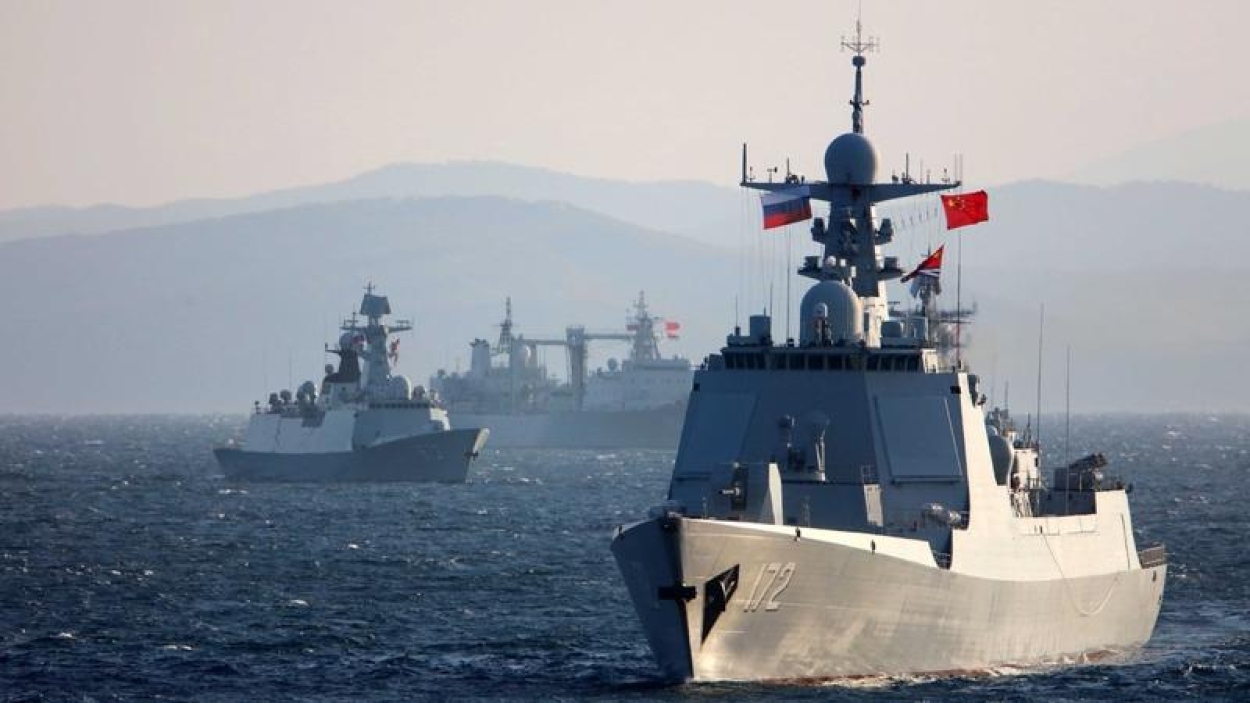Chabahar Port Hosts Russia, China, Iran Naval Drills; Security Belt 2025 Highlights ‘Anti-West’ Trilateral Bloc

The Russian defense ministry announced the launch of the Maritime Security Belt 2025 joint exercises that involve naval forces from Russia, Iran, and China at Iran’s strategic Chabahar port.
The ministry outlined that the drills, conducted over several days in the northern Indian Ocean, will focus on training to liberate captured vessels, perform search and rescue missions at sea, and conduct artillery firing exercises.
The Chinese participating troops consist of the guided-missile destroyer Baotou (Hull 133) and the comprehensive supply ship Gaoyouhu (Hull 904) of the 47th Chinese naval escort taskforce.
According to Chinese state media, Iran sent more than 10 ships of various types, including the Jamaran and Alvand destroyers. Russia sent ships, including corvettes Hero of the Russian Federation Aldar Tsydenzhapov and Rezky.
In addition, South Africa, Pakistan, Oman, and other countries sent observers to participate in the exercise.
The Maritime Security Belt exercises began in 2018, when the first drills were conducted in the Arabian Sea, a vital artery for global trade and energy flows. Since then, they have evolved into recurring events, with the 2025 iteration marking the seventh of its kind, Russian state media, Tass reported.
The 2025 exercises began with an opening ceremony at Chabahar port, a strategic location on Iran’s southeastern coast that provides direct access to the Indian Ocean.
The Maritime Security Belt exercises are designed to enhance the operational capabilities of participating navies through a range of practical and tactical drills. Over several days in the northern Indian Ocean, the crews focus on scenarios that mirror real-world maritime threats.

Key Activities
Ship Liberation Operations: Training to free vessels seized by hostile forces, simulating counter-piracy or anti-terrorism missions.
==================================================
==================================================
Search and Rescue Missions: Conducting coordinated operations to locate and assist distressed vessels or personnel at sea, a critical skill for humanitarian and disaster response.
Artillery Firing Exercises: Engaging sea-based and aerial targets to improve combat readiness and precision in live-fire scenarios.
These activities not only test the technical proficiency of the naval forces but also build interoperability among the participating countries. By practicing joint operations, the navies aim to streamline communication, align tactics, and ensure seamless coordination in potential real-world contingencies.
It is no coincidence that the Northern Indian Ocean will be the theater for these exercises. This region is a hub of global maritime trade, with major shipping routes connecting Asia, Africa, and Europe.
The Arabian Sea and the Gulf of Oman, in particular, are critical chokepoints for energy shipments, with the nearby Strait of Hormuz serving as a conduit for a significant portion of the world’s oil supply.
Ensuring the security of these waters is a shared interest for Russia, Iran, and China, each of which has economic and strategic stakes in maintaining open and safe sea lanes.
For Iran, hosting the Maritime Security Belt exercises reinforces its role as a key maritime player in the region, projecting influence beyond its immediate borders. Russia and China, meanwhile, use these drills to expand their naval presence in the Indian Ocean, signaling their intent to safeguard their interests in a region traditionally dominated by Western naval powers.
The Maritime Security Belt exercises carry broader geopolitical implications, especially in the context of ongoing global tensions. While the drills are framed as a cooperative effort to address non-traditional security threats like piracy and maritime disasters, they also serve as a demonstration of solidarity among Russia, Iran, and China.
These nations have often found themselves at odds with Western powers over issues ranging from sanctions to military interventions, and their joint exercises can be seen as a counterbalance to Western-led maritime initiatives in the Indo-Pacific.
The inclusion of observers from other countries in past iterations—such as Azerbaijan, South Africa, and Pakistan—hints at the potential for broader multilateral engagement in the future.
==================================================
==================================================
- Questions and Answers
- Opinion
- Motivational and Inspiring Story
- Technology
- Live and Let live
- Focus
- Geopolitics
- Military-Arms/Equipment
- Seguridad
- Economy
- Beasts of Nations
- Machine Tools-The “Mother Industry”
- Art
- Causes
- Crafts
- Dance
- Drinks
- Film/Movie
- Fitness
- Food
- Juegos
- Gardening
- Health
- Home
- Literature
- Music
- Networking
- Other
- Party
- Religion
- Shopping
- Sports
- Theater
- Health and Wellness
- News
- Culture

